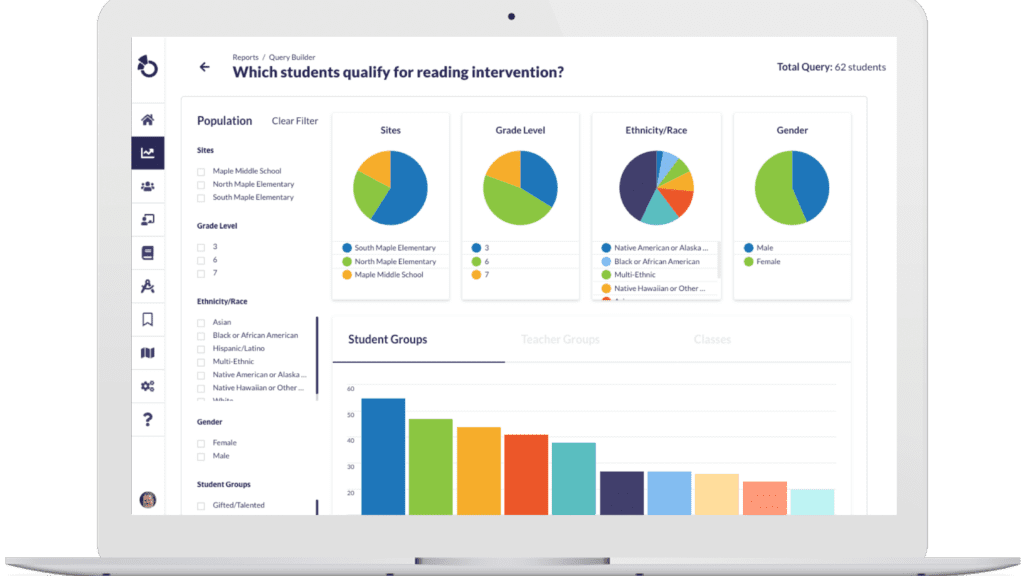The Science of Reading: A State-by-State Guide for School Leaders
By: David Specht
What is the Science of Reading?
The Science of Reading (SOR) is a body of research outlining the five most effective ways children learn to read, focusing on phonemic awareness, phonics, fluency, vocabulary, and comprehension. It’s crucial for educators to apply these evidence-based strategies to boost their students' literacy outcomes.
Below are five fundamental aspects of the SOR that every educator should be aware of:
- Phonemic Awareness and Phonics are Fundamental: Research shows that these foundational skills are crucial for reading, with explicit instruction leading to significant improvements in reading outcomes.
- Vocabulary Development is Crucial: A rich vocabulary is key to comprehension, and research shows that students with larger vocabularies tend to be better readers. Educators should, therefore, provide opportunities for students to learn new words in context and through explicit teaching.
- Reading Comprehension Requires Active Engagement: Effective comprehension requires active engagement with the text, connecting new information to prior knowledge, and employing strategies like questioning and predicting.
- Fluency Enhances Reading Proficiency: Fluency is integral to reading proficiency, enabling a focus on understanding the text.
- Instruction Should Be Systematic and Explicit: SOR calls for breaking down reading skills into smaller, manageable parts for explicit and sequential teaching.
How Does The Science of Reading Work in Your State?
As educators and policymakers across the country increasingly recognize the importance of evidence-based reading strategies, states are creating new rules to ensure their schools’ approaches are grounded in solid research. These changes focus on improving how teachers are trained, what students learn, and how their reading skills are checked. It's all about a shared goal: using proven methods to help kids become better readers. This effort shows how states are taking steps to improve education, ensuring every student has the chance to succeed.
California: In 2021, California set new rules for teacher training programs to emphasize essential reading skills, including for English learners. Starting in 2025, new tests for teachers will ensure they're equipped to teach these skills. The state is also investing in literacy coaching and creating a "literacy roadmap" to guide reading instruction improvements.
Florida: Florida's 2023 law stops the use of outdated teaching methods and builds on 2021 efforts to monitor student reading progress more closely. It also ensures schools have access to expert reading coaches, identifies top-notch teaching materials, and requires specialized training for teachers helping struggling readers.
Illinois: The state is stepping up to offer clear guidelines on choosing reading programs, training teachers, and developing a statewide plan for better reading instruction. A new test for teachers will check their knowledge of effective reading strategies, including teaching bilingual students.

How Does Otus Align With State Legislation on the Science of Reading?
Equipping educators with the right tools is essential for enhancing students' literacy development in line with state legislation on the Science of Reading. Below are specific features in Otus that can help educators to align their practices with state-specific legislation.
Educators can analyze data from any third-party reading assessment in Otus to identify patterns and trends in students' reading abilities, including if they are below grade-level reading expectations.
Common examples of third-party reading assessments that schools may be using for early identification include DIBELS, AIMSweb, Fountas and Pinnell, STAR reading, Scholastic Reading Inventory, iReady, and more. All of these can be visualized in Otus.
Once students are identified as below grade-level reading expectations, educators can create personalized plans in Otus to support their needs.
Otus can integrate data from reading universal screening tools commonly used in school districts. This integration allows for seamless importing of data from these assessments into the Otus platform. This data can then be used for early identification as noted in #1.
Some states are requiring the purchase of evidence-based reading programs in addition to universal screening measures. One example of a program grounded in the SOR is Amplify CLKA. Otus offers prebuilt Amplify CKLA assessments so that data can be collected and visualized in Otus side-by-side with other reading measures the district is using.
Otus enables teachers, administrators, and other stakeholders (including students and their families) to monitor students' progress in real-time as they work through their personalized reading plans. Teachers can track reading fluency, comprehension, vocabulary development, and other key indicators to gauge student growth and adjust plans accordingly.
The Big Picture
Otus aligns with state legislation on the science of reading by providing a comprehensive platform for early identification, personalized intervention planning, and data analysis. It integrates data from various reading assessments, including third-party assessments like DIBELS and Amplify CKLA, allowing educators to create personalized plans and track student progress in real-time.
By visualizing all relevant data in one place, Otus enables informed decision-making to drive student growth and ensure alignment with state-mandated requirements for evidence-based reading programs and universal screening measures. To learn more about how Otus can support your school or district's Science of Reading initiative, request a demo.
Request a demo!
See exactly how Otus can help your school accelerate student growth and improve student outcomes – all while saving educators time.





